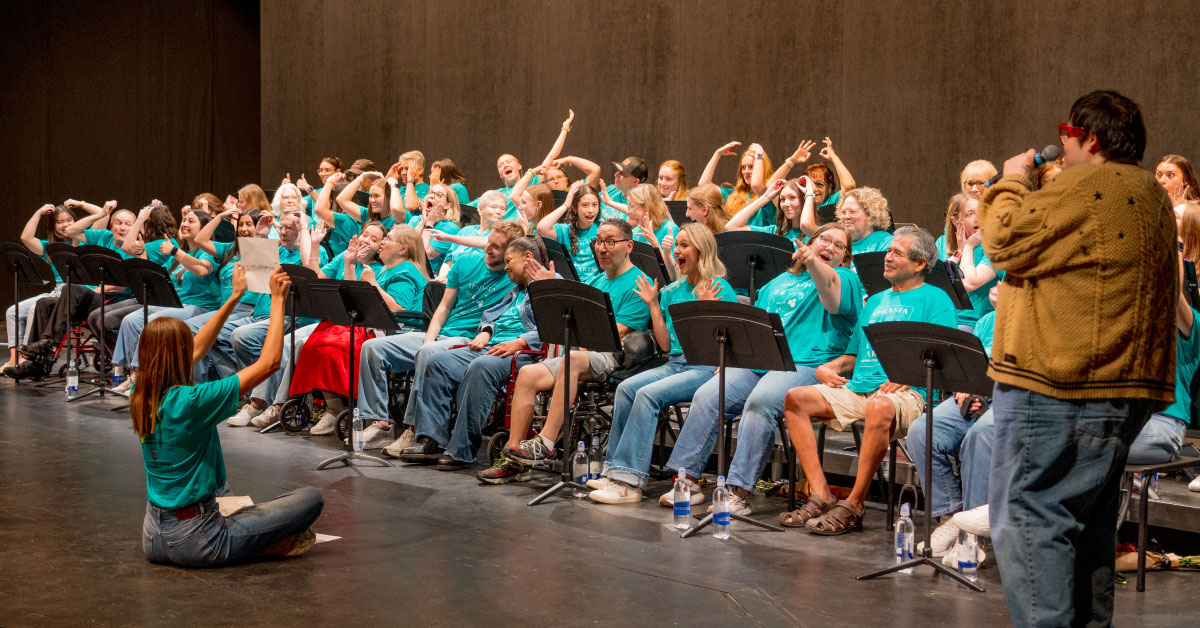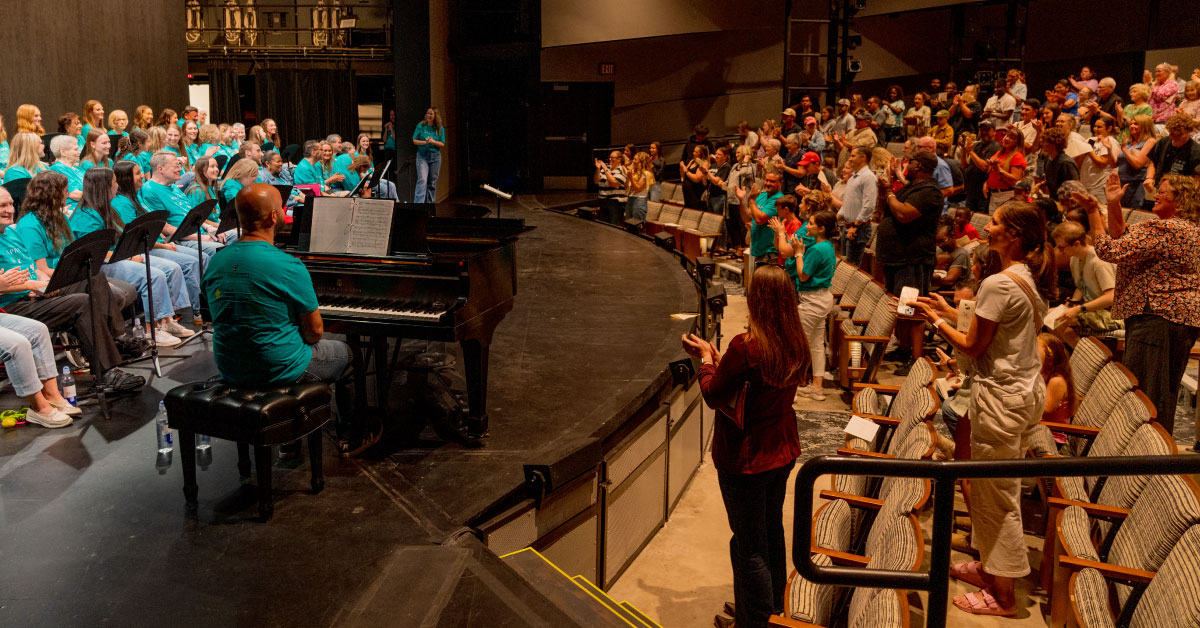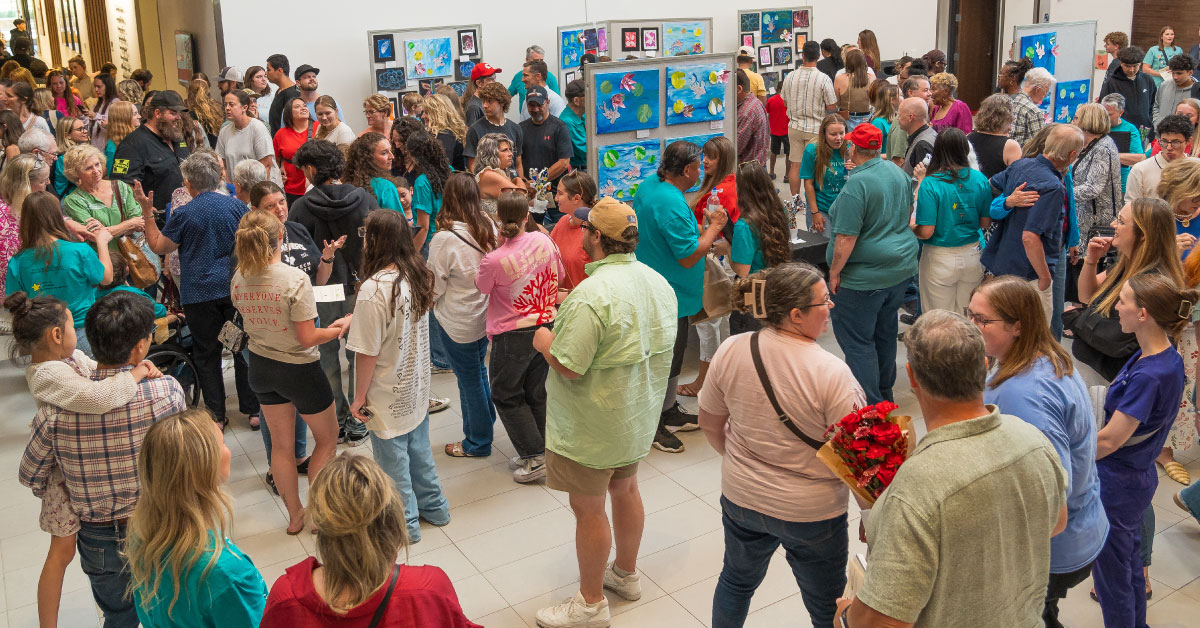Concert, Art Exhibit Celebrate End of Two-Week Arts Program for Individuals with Aphasia
June is Aphasia Awareness Month

Families, friends and members of the Lubbock community showed their support for the arts and those with aphasia at a June 12 concert and art exhibit marking the end of a two-week arts camp. The free event, held at the Texas Tech University Charles E. Maedgen Jr. Theatre, included performances and artwork by program participants.
 The Summer Aphasia Arts Program is held by the Texas Tech University Health Sciences Center (TTUHSC) School of Health Professions Stroke and Aphasia Recovery (StAR) Program in partnership with the Texas Tech University J.T. & Margaret Talkington College of Visual & Performing Arts (TCVPA). The annual camp focuses on visual art, choir and drama for stroke and traumatic
brain injury survivors who have a type of communication challenge called aphasia.
It serves as a creative outlet for these individuals.
The Summer Aphasia Arts Program is held by the Texas Tech University Health Sciences Center (TTUHSC) School of Health Professions Stroke and Aphasia Recovery (StAR) Program in partnership with the Texas Tech University J.T. & Margaret Talkington College of Visual & Performing Arts (TCVPA). The annual camp focuses on visual art, choir and drama for stroke and traumatic
brain injury survivors who have a type of communication challenge called aphasia.
It serves as a creative outlet for these individuals.
“The summer arts portion of the StAR Program is an intensive, summer program that runs the first two weeks of June,” Melinda Corwin, Ph.D., professor and assistant director, Department of Speech, Language and Hearing Sciences, said. “The program is for stroke survivors and people with primary progressive aphasia.”
 Aphasia is a language disorder that affects the part of the brain responsible for
language. More than two million people in the U.S. are estimated to have aphasia and
have lost all or some ability to use words. It also affects their ability to understand
what others are saying to them, or to understand symbols of language on a page. The
person may have trouble reading, texting, typing or communicating via email. The condition
ranges from mild to severe and can happen to anyone who experiences a stroke, traumatic
brain injury, brain tumor or degenerative brain disease.
Aphasia is a language disorder that affects the part of the brain responsible for
language. More than two million people in the U.S. are estimated to have aphasia and
have lost all or some ability to use words. It also affects their ability to understand
what others are saying to them, or to understand symbols of language on a page. The
person may have trouble reading, texting, typing or communicating via email. The condition
ranges from mild to severe and can happen to anyone who experiences a stroke, traumatic
brain injury, brain tumor or degenerative brain disease.
It does not affect intelligence.
“Typically, aphasia involves damage on the left side of the brain, which is our language center for spoken and written words,” Corwin said. “When we use the arts as a form of therapy, we’re tapping into the right side of the brain, and we’re using the right side to mediate or to help the damaged left side of the brain. We use visual arts and performing arts such as choir and drama, and we find that it really helps to promote language and communication.”
The summer arts camp is an extension of the StAR Program, an annual nine-month initiative that runs September through May.
Related Stories
The John Wayne Cancer Foundation Surgical Oncology Fellowship Program at Texas Tech University Health Sciences Center Announced
TTUHSC is collaborating with the John Wayne Cancer Foundation and has established the Big Cure Endowment, which supports the university’s efforts to reduce cancer incidence and increase survivability of people in rural and underserved areas.
Making Mental Health a Priority in the New Year
Sarah Mallard Wakefield, M.D., a psychiatrist with Texas Tech Physicians, talks about strategies to combat widespread and growing anxiety.
TTUHSC Dean to be Inducted into the National Academies of Practice as Distinguished Fellow
Gerard E. Carrino, Ph.D., MPH, dean of the TTUHSC Julia Jones Matthews School of Population and Public Health, will be inducted into the National Academies of Practice (NAP) as a Distinguished Fellow of the Public Health Academy.
Recent Stories
The John Wayne Cancer Foundation Surgical Oncology Fellowship Program at Texas Tech University Health Sciences Center Announced
TTUHSC is collaborating with the John Wayne Cancer Foundation and has established the Big Cure Endowment, which supports the university’s efforts to reduce cancer incidence and increase survivability of people in rural and underserved areas.
TTUHSC Receives $1 Million Gift from Amarillo National Bank to Expand and Enhance Pediatric Care in the Panhandle
TTUHSC School of Medicine leaders accepted a $1 million philanthropic gift from Amarillo National Bank on Tuesday (Feb. 10), marking a transformational investment in pediatric care for the Texas Panhandle.
Texas Tech University Health Sciences Center Permian Basin Announces Pediatric Residency Program Gift
TTUHSC Permian Basin, along with the Permian Strategic Partnership and the Scharbauer Foundation, Feb. 5 announced a gift that will fund a new pediatric residency.
